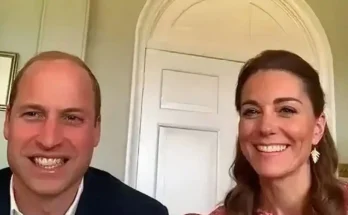When her daughter arrived for dinner with her husband and baby, everything seemed normal. But during the meal, Elizabeth noticed something so alarming in her son-in-law that, two days later, she urged her daughter to leave him immediately.
My daughter, Susan, married Stan three years ago. From the moment she introduced him to us, I thought she had found her dream partner. Stan was rich, handsome, and charming. Everyone who met him raved about how lucky Susan was to have him. He was polite, educated, and doting… everything my daughter deserved. Honestly, I agreed.
I still remember their wedding. Susan looked radiant in her gown, and Stan was every bit the picture-perfect groom, holding her hand and whispering sweet nothings during the ceremony.
Together, they seemed like the golden couple. When they had Gabriel, their one-year-old son, it felt like their little family was the culmination of a fairy tale.
But as time passed, small cracks started to show. At first, I dismissed them. Nobody’s perfect, right? But last Sunday’s dinner changed everything.
When Susan called to ask if she, Stan, and Gabriel could come over for dinner, I was thrilled. It had been a while since we’d all sat down together, and I loved any excuse to spend time with my grandson. He’s the light of my life, a giggling little boy with his mom’s blue eyes.
“Mom, I’ll bring dessert,” Susan offered over the phone, sounding upbeat.
“Don’t worry about that. Just bring yourself, Gabriel, and Stan,” I said.
When they arrived, Gabriel toddled in first, gripping his stuffed elephant like it was a lifeline. Susan followed with a casserole dish, her smile warm but tired. Stan came in last, dressed impeccably, scrolling through his phone with a distracted look on his face.
“Hey, Elizabeth,” he said, barely glancing up before plopping onto the couch.
Susan busied herself helping Gabriel out of his jacket and setting the casserole on the counter. I greeted her with a hug and kissed her cheek. “You look tired, honey. Everything okay?”
“Just the usual,” she said with a shrug, avoiding my eyes.
Dinner was ready soon after, and we all gathered at the table. The roasted chicken and vegetables smelled amazing, and Gabriel was giggling in his high chair, slapping his tiny hands on the tray.
That’s when Stan leaned back in his chair and handed his plate to Susan. “You know what I like,” he said, his tone casual but authoritative. “And don’t mix the food, alright? You remember how much I hate that.”
My fork paused mid-air.
Susan hesitated, her cheeks reddening, but she took the plate. As she carefully spooned each item onto it, Stan added, “Don’t be stupid and clumsy.”
I was stunned and assumed that it was just some kind of inside joke. But Susan wasn’t laughing.
The rest of dinner was strained. Susan tried to steer the conversation, asking me about my garden and telling me little stories about Gabriel. But Stan kept interrupting with more commands.
“Another drink, Susan. Make it a double,” he said, pushing his empty glass toward her. “Hurry up, will you? Even sloths are faster!”
She was halfway through her meal but got up anyway, pouring his whiskey with mechanical precision. Her movements were calculated and practiced… as if she’d done this a thousand times before.
I couldn’t hold it in any longer. “Stan,” I said, forcing a smile, “you know the drinks are right there. You could help yourself.”
He looked up, his eyes boring into mine. “Thanks, Elizabeth, but Susan knows how I like it,” he drawled, his tone dripping with a fierceness that made my skin crawl.
Susan placed the drink in front of him, her hands trembling slightly. She didn’t meet my eyes when she sat back down, her posture rigid, and her silence screaming volumes.
“Pass the salt,” Stan barked at her, not even bothering to look up from his plate.
I watched Susan’s jaw clench. For a split second, I saw a flash of frustration in her eyes before she quickly masked it.
After dinner, Stan and my husband disappeared into the den to watch football, leaving Susan to clear the table. I followed her into the kitchen, where she was scrubbing a pan with more force than necessary, her knuckles white around the sponge.
“Susan, honey,” I said softly, “are you okay?”
She didn’t look up. “Yeah, Mom. Just tired.”
I wasn’t buying it. “The way Stan spoke to you tonight… does he always talk to you like that?”
Her hand stilled, and for a moment, I thought she wasn’t going to answer. Then she sighed, her shoulders sagging. “It’s complicated.”
“Complicated how?” I pressed, my motherly instinct rising. “Because from where I’m watching, it looks like he treats you more like a servant than a wife.”
Susan finally turned, her eyes glistening with unshed tears and something darker.
We sat on the back porch, Gabriel between us with a bowl of ice cream. The night air was cool, and the crickets chirped in the distance. I waited, giving Susan some space, my hand hovering protectively near Gabriel’s bowl to catch any potential drips.
Eventually, she started talking, her voice so quiet it was almost lost in the evening’s ambient sounds.
“Mom, Stan is… controlling. I don’t know when it started, but it’s like he has to have a say in everything. If I cook, it’s never right. The smallest things… like a slightly overcooked chicken, seasoning not quite to his taste… and he’ll make these hurtful comments that cut deeper than any direct criticism.”
She paused, watching Gabriel lick his spoon, a sad smile flickering across her face.
“If I wear something he doesn’t like, he’ll make these subtle digs. ‘That color washes you out,’ or ‘Is that really appropriate?’ Until I feel so self-conscious that I change into something that he wants. It’s like I’m constantly performing for an impossible-to-please audience.”
I frowned. “What about work? You love your job.”
“Susan wiped Gabriel’s chin as he babbled happily, seemingly oblivious to the weight of the conversation among us adults.”
“I do. I love teaching. Those kids… they’re my passion. But Stan’s been systematically dismantling that passion. He’s been pressuring me to cut back my hours, saying Gabriel needs me more than my students do.”
“He argues that being a full-time mother is my most important job. As if the years of education, the career I’ve built, mean nothing. I argued at first. But he made such a big deal out of it, turning every discussion into a battle. He’s been guilt-tripping me and making me feel like a terrible mother for wanting a professional life.”
“And how do you feel about that?” I asked, my hand now resting on her knee.
Susan’s voice cracked. “I hate it. I absolutely hate it. I feel like I’m suffocating. Teaching wasn’t just a job… it was my identity, my way of contributing to the world. And now? I’m slowly being erased.”
She looked up, her eyes full of pain and desperation. “Stan keeps reminding me that he’s the breadwinner. That I should be grateful he allows me to work part-time at all. He says if I don’t focus exclusively on the family, I’m being selfish. And ungrateful.”
Her tears fell silently, tracing delicate paths down her cheeks. “And I’m scared, Mom. If I push back too much, he’ll… I don’t know. Withdraw emotionally? Become even more controlling? Sometimes I feel like I’m walking on eggshells in my own home. I feel like a puppet.”
I reached for her hand, squeezing it firmly. “Susan, that’s not normal. That’s not love. That’s manipulation. That’s control.”
Gabriel, sensing the emotional undercurrent, looked up from his ice cream, his innocent eyes moving between his mother and me.
“It’s my life now. I have to deal with it, whether I like it or not.”
“Sweetie, but—” I rose along with her.
“It’s getting late… time to go,” she said, already heading back inside, leaving me with a haunting feeling that this was far from over.
Two days later, I went to Susan’s house while Stan was at work. She greeted me with a cautious smile, Gabriel cozily nestled on her hip.
“I needed to see you,” I said as we sat in her living room.
“I’m fine, Mom,” she replied, setting Gabriel down with his toys. But I could see the exhaustion in her eyes.
I took a deep breath. “Susan, the way Stan treats you… it’s not right. And it’s not okay for Gabriel to grow up seeing that.”
Her eyes welled up again. “Mom, I know it’s not okay. But he’s not always like this. Sometimes he’s sweet. He can be such a good dad when he tries. He says he’ll bond with Gabriel when he’s older, you know.”
“That’s not good enough,” I said firmly. “You deserve more than a husband who ‘tries.’ And Gabriel deserves better than a father who picks and chooses when to show up. Have you tried to get him to seek therapy?”
“He won’t go to counseling,” she said. “He says he doesn’t need a stranger telling him how to run his marriage.”
I couldn’t keep quiet any longer. “Susan, have you thought about leaving him?”
She stared at me, her lip trembling. “I don’t know if I can. What if he takes Gabriel? Or what if I can’t support us?”
“You’re stronger than you think,” I said, squeezing her hand. “And you don’t have to do this alone. Your dad and I will help you… money, a place to stay, whatever you need. Just… I know I shouldn’t be saying this to my own daughter. I think divorcing him is the only way out, honey.”
It took weeks of gentle conversations and planning, but Susan finally decided to leave Stan. She contacted a lawyer, started setting aside money, and told Stan she wanted a divorce.
“He didn’t even take me seriously at first,” she told me over the phone. “When I first brought up the divorce, he was cleaning his glasses, just sitting there, methodically wiping it down, looking at me with this… cold calculation.”
“He didn’t say anything?” I gasped.
“He laughed, Mom,” she continued, her voice beginning to shake. “Not a normal laugh. This cruel, mocking sound. He said I’d come crawling back. That I was nothing without him. ‘Who else would put up with you?’ he chuckled. ‘Who would deal with your mood swings, your constant complaining?’”
I gritted my teeth, my hand clenching the phone so tightly my knuckles turned white. “And what did you say?”
There was a pause. Then Susan’s voice came through. “I told him I’m done. Completely, absolutely done. I looked him dead in the eye and said, ‘The only thing I’m crawling away from is this marriage.’”
“I’m not that scared girl anymore, Mom. I’m a mother. I’m a teacher. I’m my own person.”
Susan moved in with us after that. The divorce proceedings are underway, and Stan’s parents have been blaming me for the fallout.
Now, as I sit here writing this, I can’t help but question if I did the right thing by pushing my daughter to leave her husband. The weight of my intervention feels both liberating and terrifying.
Was it my place to encourage her? To plant the seed of rebellion in her mind, to help her see that the life she was living was not a marriage, but a slow, systematic erosion of her spirit?
All I know is that I couldn’t stand by and watch my daughter be diminished by someone who was supposed to love her. Every time I recall the way Stan looked at her, like she was a piece of furniture to be positioned, adjusted, controlled… something inside me burned with a maternal fury I’d never known before.
I remember the nights Susan would call, her voice small and broken. The times she’d make excuses for Stan’s behavior. “He’s just stressed.” “He didn’t mean it that way.” Each justification was another brick in the wall of her own imprisonment.
Gabriel deserved better. Susan deserved better.
I want to believe I did the right thing. I want to believe that by helping her find her courage, I’ve given her a chance at real happiness. But doubt, that insidious companion, whispers its persistent questions.
Was I right? Or wrong? What would you have done if you were in my shoes? Watching your daughter slowly disappear into the shadow of a man who claimed to love her, but who loved only the idea of controlling her?



